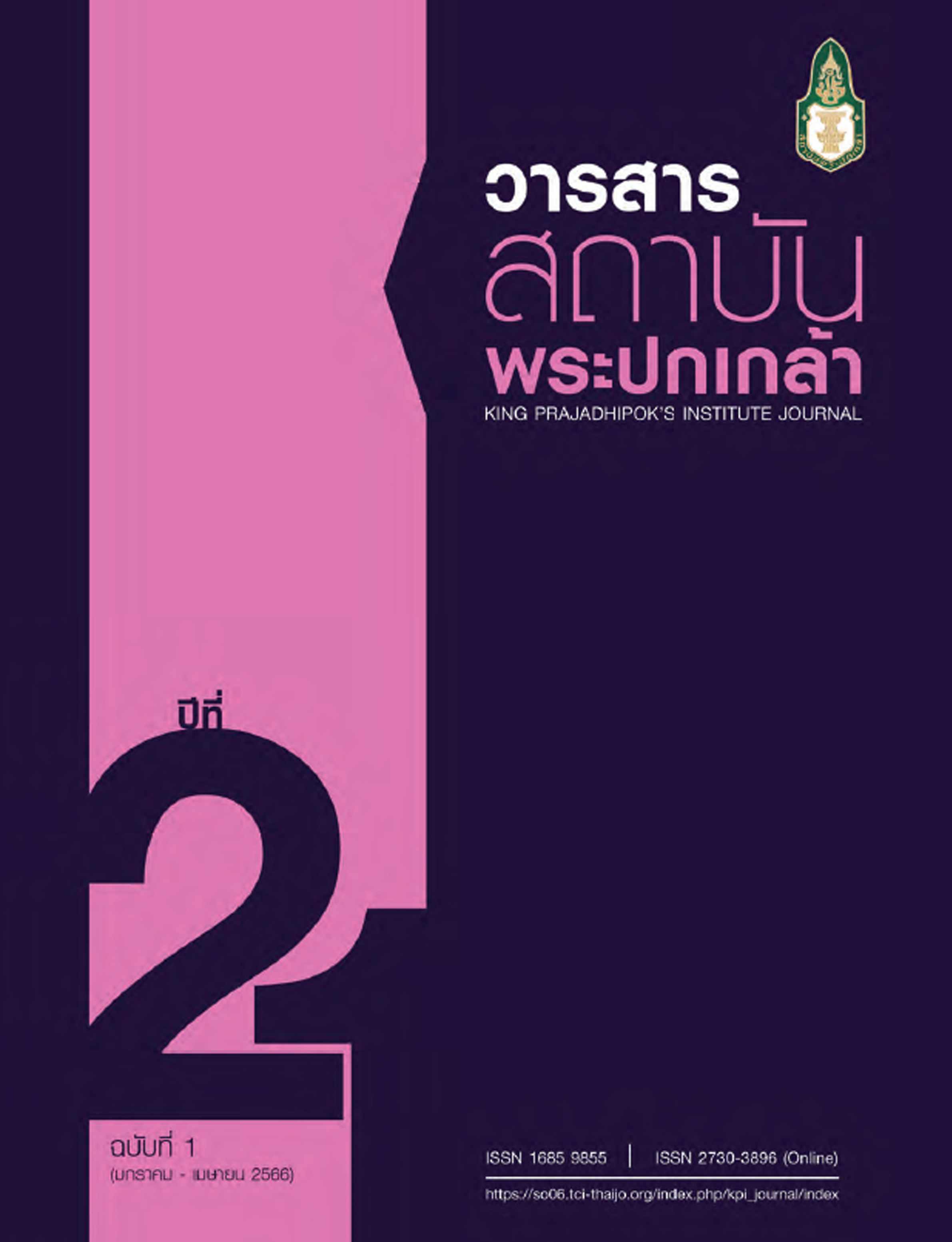Knowledge Gaps from Research Papers, Challenges and Policy Recommendations on Thai Environmental Management
Main Article Content
Abstract
This paper presents a review of research papers and opinions by academics and government representatives during public consultations organized by the Research Project. The objective is to analyze gaps, challenges, and opportunities that would benefit the Thai government’s environmental policy. The environmental issues presented are an example of some of the practices. The literature review finds the knowledge gaps in environmental knowledge and management. The findings are as follows:
1) Bio-diversity loss: lacking the approach of biodiversity loss, ecological systems, and knowledge of the innovative agriculture are missing;
2) Water management: unplanned for water security;
3) Pollution: lacking knowledge of pollution’s risk which is not sufficiently accurate and reliable in all areas;
4) Marine and coastal resources: establishing information from the database is not inadequate and unsystematic to support the governance of maritime and coastal regions at the national level;
5) Climate change: most studies are divided into the sectoral field; lacking systematic and holistic analysis to be able to cope with climate-related risks in the long term.
The findings highlight two main challenges in developing environmental policy and managing its governance. First, the way in which knowledge obtained from research is being used in the making of environmental policy. Second, the lack of comprehensive databases that support the development of evidence-based environmental policy. The recommendations are the following: improving the research funding system to initiate innovations; integrating various sectors in environmental research; building shared platforms and other knowledge exchange mechanisms for ongoing scientific research; and cooperating with other countries and international organizations in environmental research.
Article Details

This work is licensed under a Creative Commons Attribution-NonCommercial-NoDerivatives 4.0 International License.
@ 2020 King Prajadhipok's Institute The Government Complex Commemorating All Right Reserved.
References
ภาษาไทย
กรมควบคุมมลพิษ. (2563). สถานการณ์คุณภาพสิ่งแวดล้อมของประเทศไทย ปี 2563. สืบค้นจาก https://www.pcd.go.th/pcd_news/11873/
กรมทรัพยากรทางทะเลและชายฝั่ง. (2561ก). นักวิชาการชวนนักท่องเที่ยวสังเกตปะการังฟอกขาวในท้องทะเลไทย. สืบค้นจาก https://www.dmcr.go.th/detailAll/23199/nws/16
กรมทรัพยากรทางทะเลและชายฝั่ง. (2561b). รายงานสถานการณ์ด้านทรัพยากรทางทะเลและชายฝั่ง และการกัดเซาะชายฝั่งของประเทศไทย พ.ศ. 2561. กรุงเทพฯ: กรมทรัพยากรทางทะเลและชายฝั่ง.
ธารา บัวคำศรี. (2564). ถึงเวลาฟื้นฟูโลก เกิดอะไรขึ้นบ้างกับสิ่งแวดล้อมในช่วงไวรัสโควิดระบาด. สืบค้นจาก https://www.greenpeace.org/thailand/story/19738/general-earth-day-2021/
เผดิมศักดิ์ จารยะพันธุ์. (2562). โครงการการจัดทำข้อเสนอแนะเชิงนโยบายฉบับย่อในประเด็นเร่งด่วนเกี่ยวกับผลประโยชน์ทางทะเลของประเทศไทย. กรุงเทพฯ: สำนักงานกองทุนสนับสนุนการวิจัย.
มูลนิธิสถาบันสิ่งแวดล้อมไทย. (2564). ขยะติดเชื้อพุ่ง 20 ตันต่อวันวาง 1,000 จุดทิ้งแมสก์ พับ ก่อน ทิ้ง. สืบค้นจาก http://www.tei.or.th/th/highlight_detail.php?event_id
=1150
มูลนิธิสืบนาคะเสถียร. (2563). รายงานสถานการณ์ป่าไม้ไทย ประจำปี 2562 – 2563. สืบค้นจาก https://www.seub.or.th/document/สถานการณ์ป่าไม้ไทย/รายงานสถานการณ์ป่าไม้ไ-6
มูลนิธิสืบนาคะเสถียร. (2564). กู้อวนทับปะการังเกาะโลซินสำเร็จ พบนิเวศเสียหายรวมกว่า 550 ตร.ม. สืบค้นจาก https://www.seub.or.th/bloging/news/losin-island-2/
วิชาญ ศิริชัยเอกวัฒน์. (2563). EU-IUU หลุมพรางการพัฒนาการทำประมงอย่างยั่งยืน: กรณีประเทศไทย. เอกสารนำเสนอในงานสัมมนา Maritime Studies and Marine Innovation: Towards a Sustainable Ocean. กรุงเทพฯ.
ศิริรัตน์ สังขรักษ์, พ. ร., อาทิตย์ เพ็ชร์รักษ์, และ สุทธิรัตน์ กิตติพงษ์วิเศษ. (2563). ผลกระทบของสภาพภูมิอากาศที่เปลี่ยนแปลงต่อทรัพยากรน้ำและการจัดการ. วารสารสิ่งแวดล้อม, 24(1), 1-8.
สหประชาชาติ ประเทศไทย. (2564). รายงานผลการดำเนินการของสหประชาชาติ ประจำประเทศไทย ปี 2020. กรุงเทพฯ: สหประชาชาติ ประเทศไทย.
สำนักงานการวิจัยแห่งชาติ. (2562). วช. จัดแถลงข่าว พะยูนมาเรียม ทะเลไทย ต้อง ไร้ขยะ. สืบค้นจาก https://www.nrct.go.th/ข้อมูลข่าวสาร/เอกสารเผยแพร่/วช-จัดแถลงข่าว-พะยูนมาเรียม-ทะเลไทย-ต้อง-ไร้ขยะ/
สำนักงานนโยบายและแผนทรัพยากรธรรมชาติและสิ่งแวดล้อม. (2561). พื้นที่ชุ่มน้ำของประเทศไทย. สืบค้นจาก https://www.onep.go.th/พื้นที่ชุ่มน้ำของประเทศ
สุจิตรา วาสนาดำรงดี. (2564). การศึกษาเพื่อจัดทำนโยบายสาธารณะปฏิรูประบบการจัดการขยะและส่งเสริมเศรษฐกิจหมุนเวียน. กรุงเทพฯ: สํานักงานกองทุนสนับสนุนการสร้างเสริมสุขภาพ.
สุชาย วรชนะนันท์. (2564). การพัฒนาความรู้ทางวิทยาศาสตร์เพื่อสนับสนุนการบริหารจัดการทรัพยากรทางทะเล ใน เวทีเสวนา TSRI Talk การพัฒนาระบบการบริหารจัดการทรัพยากรทางทะเลของไทย: จากแนวคิดและนโยบายสู่การปฏิบัติ (น. 28). กรุงเทพฯ: สำนักงานคณะกรรมการส่งเสริมวิทยาศาสตร์ วิจัยและนวัตกรรม (สกสว).
องค์การกองทุนสัตว์ป่าโลกสากล ประเทศไทย (WWF Thailand). (2560). โครงการเสริมสร้างศักยภาพความเข้มแข็งและการมีส่วนร่วมของชุมชนเพื่อการจัดการทรัพยากรน้ำและฟื้นฟูระบบนิเวศพื้นที่ชุ่มน้ำแม่น้ำสงครามตอนล่าง จังหวัดนครพนม (พ.ศ. 2557-2560). สืบค้นจาก https://www.wwf.or.th/what_we_do/wetlands_and_production_
landscape/projectsall/bkl/
อำนาจ ชิดไธสง และอัศมน ลิ่มสกุล. (2557). รายงานการสังเคราะห์และประเมินองค์ความรู้ด้านการเปลี่ยนแปลงสภาพภูมิอากาศ ครั้งที่ 5 ภายใต้ IPCC. กรุงเทพฯ: สำนักงานคณะกรรมการส่งเสริมวิทยาศาสตร์ วิจัยและนวัตกรรม (สกสว).
ภาษาอังกฤษ
plasticethics. (2019). The Countries Polluting the Oceans the Most with Plastic Waste. Retrieved from https://www.plasticethics.com/home/2019/3/17/the-countries-polluting-the-oceans-the-most-with-plastic-waste


